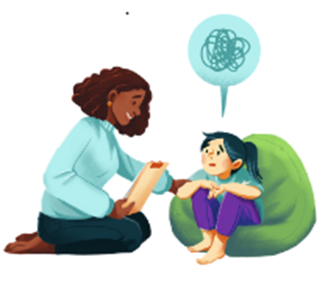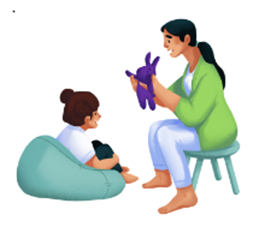Mental Health
At Lingey House Primary School, we drive with the vision that “mental health difficulties should be tackled with the same vigour and commitment that is applied to improving academic performance.” We are committed to supporting the mental health and wellbeing of our whole school community (children, staff, governors, parents and carers). We have a supportive and caring ethos and our approach is respectful and kind, where each individual and their contribution is valued. At our school, we know that everyone experiences life challenges that can make us vulnerable and, at some point, everyone may need additional emotional support. We take the view that positive mental health is everybody’s business and that we all have a role to play.
At our school we:
- Help children to understand their emotions and feelings better.
- Help children feel comfortable sharing any concerns or worries.
- Help children socially to form and maintain relationships.
- Promote self-esteem and ensure children know that they count.
- Encourage children to be confident and ‘dare to be different’.
- Help children to develop emotional resilience and to manage setbacks.
- Care about mental health as much as physical health and academic performance.
We promote a mentally healthy environment through:
 Promoting our school values and encouraging a sense of belonging.
Promoting our school values and encouraging a sense of belonging.- Promoting pupil voice and opportunities to participate in decision-making.
- Celebrating academic and non-academic achievements.
- Providing opportunities to develop a sense of worth through taking responsibility for themselves and others.
- Providing opportunities to reflect.
- Raising awareness of mental health and wellbeing through the curriculum and school’s social media.
- Established mental health ambassadors, whose role is to raise awareness of mental health and wellbeing, provide ‘catch up’ sessions with children who are struggling and liaise with staff.
- Encouraging an ‘open-door’ policy for families to share concerns and offer support.
- Applying and receiving DfE funding and employing a fully-trained senior mental health lead.
- Access to appropriate support that meets their needs.
- Encouraging a culture of ‘no judgement’ throughout the whole school community in relation to mental health difficulties.
Teaching about Mental Health:
The skills, knowledge and understanding needed by our students to keep themselves mentally healthy and safe are included as part of our PSHE/RSE curriculum. The specific content of lessons will be determined by the needs of the cohort we’re teaching but we will also use the Jigsaw scheme to ensure that we teach mental health and emotional wellbeing issues in a safe and sensitive manner. Each week, assemblies are taught following the Jigsaw scheme, which highlights mental health difficulties at an age appropriate level. Each term, our mental health ambassadors visit each class for ‘Putting Mental Health in the spotlight’. The children are given a different mental health difficulty and complete a presentation to raise awareness of mental health difficulties at an age appropriate level.
Targeted support:
After the mental health concern referral (see Appendix 1) has been completed, the school will offer support through targeted approaches for individual pupils or groups of pupils which are tailored to their specific need. This support may include:
- Circle time approaches.
- Managing feelings resources e.g. WRAP plans for those identified as being ‘at risk’ (see Appendix 3) ‘worry boxes’ and ‘Anxiety Gremlins’.
- Managing emotions resources such as ‘the 5-point scale’.
- Mental Health and Wellbeing ‘drop ins’ with ambassadors.
- Drawing and Talking.
- Therapeutic activities including art, Lego and relaxation and mindfulness Techniques (Relax Kids).
- Kalmer Counselling.
- RISE (1:1 and group support sessions).


The school uses our vulnerability registers, peer and parent conversations, pupil surveys and resources to assess and track wellbeing as appropriate. It is ensured that staff, pupils and parents are signposted to what support is available within our school and how to access further support. Identifying needs and Warning Signs: Vulnerability registers will be completed between the Senior Mental Health Lead and class teachers at the start of the school year and then updated termly. These trackers identify the children’s overall level of vulnerability by assessing them against a range of possible difficulties which may mean that the child requires additional support to help them manage and thrive.
These possible indicators include:
|
|
School staff may also become aware of warning signs which indicate a student is experiencing mental health or emotional wellbeing issues. These warning signs should always be taken seriously and staff observing any of these warning signs should communicate their concerns with the designated child protection and safeguarding officers or the emotional wellbeing lead as appropriate. Possible warning signs include:
- Changes in eating / sleeping habits.

- Becoming socially withdrawn.
- Changes in activity and mood.
- Talking or joking about self-harm or suicide.
- Expressing feelings of failure, uselessness or loss of hope.
- Repeated physical pain or nausea with no evident cause.
- An increase in lateness or absenteeism.
- Changes in behaviour.
- Friendship issues.
